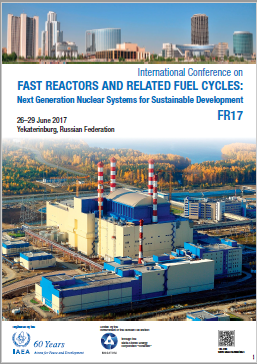Speaker
Mr
Jeonghyeon Lee
(UNIST)
Description
Ferritic-martensitic steel (FMS), which contains 9-12 wt.% of chromium, is being considered as an attractive candidate material for a fuel cladding of a sodium-cooled fast reactor (SFR) due to their high thermal conductivities, low expansion coefficients and excellent irradiation resistances to a void swelling compared with austenitic stainless steels [1, 2]. The cladding should have excellent features such as a good corrosion resistance and low dissolution at high temperatures. Through evaluation of the compatibility of the cladding materials, it was also observed that the degradation, caused by corrosion and dissolution, decreases the mechanical property.
Gr. 92 steel (9Cr-0.5Mo-1.8W-VNb) is one of the advanced versions of high chromium steels that was developed in early 1990. It has higher creep-rupture strength than its predecessors, 9Cr-1Mo steel and Gr. 91 steel (9Cr-1Mo-VNb) [4]. Thus, it can be used even above 650°C, making it suitable for high temperature applications in advanced reactors.
While nuclear reactor is under operation, the structural materials of a cladding materials will be irradiated by neutron and multiple types of ion beams, which will induce the damages of the structural materials. Proton irradiation has been used in the past decades to reproduce neutron damages because protons have a scattering cross-section higher than fast neutrons and it results in the formation of displacements [5, 6].
This study is aimed to investigate the irradiation effects on the corrosion behavior of FMS using an accelerated technique, namely proton irradiation, to understand the irradiation situation of cladding material during its life time in the core. The non-irradiated and irradiated FMS materials were used for corrosion and dissolution experiments. Through the experiments, it was observed that the corrosion and dissolution were accelerated with the irradiation by proton.
Country/Int. Organization
Republic of Korea/Ulsan National Institute of Science and Technology (UNIST)
Primary author
Mr
Jeonghyeon Lee
(UNIST)

